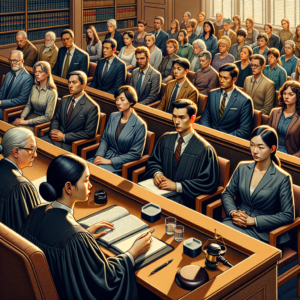Federal Court Ruling Shakes Legal Foundations: What It Means for Justice
In a landmark decision that has sent ripples through the legal community, a recent ruling by a federal court has raised significant questions about the foundational principles of justice in the United States. This ruling, which challenges long-standing legal precedents, has sparked a debate among legal experts, practitioners, and the public alike. As the implications of this decision unfold, it is crucial to analyze its potential impact on the justice system and the broader legal landscape.
Overview of the Recent Federal Court Ruling and Its Implications for Justice
The federal court ruling, delivered last week, addressed a contentious issue regarding the balance between individual rights and state interests. The court determined that certain procedural safeguards, previously considered essential for protecting defendants' rights, could be modified under specific circumstances. This decision has significant implications for the justice system, as it may lead to a reevaluation of how courts interpret constitutional protections. Legal analysts suggest that this ruling could pave the way for more flexible interpretations of due process, potentially affecting the rights of defendants in future cases and altering the landscape of criminal justice in America.
Key Legal Principles Challenged by the Court's Decision: An In-Depth Analysis
At the heart of the ruling are several key legal principles, including the right to a fair trial and the presumption of innocence. The court's decision to allow for exceptions to established procedural safeguards raises concerns about the erosion of these fundamental rights. Legal scholars argue that the ruling undermines the principle of equal protection under the law, as it may disproportionately impact marginalized communities who already face systemic biases within the justice system. Furthermore, the decision challenges the precedent set by previous rulings that emphasized the necessity of stringent protections for defendants, thereby igniting a debate about the balance between justice and expediency in legal proceedings.
Reactions from Legal Experts: Perspectives on the Ruling's Impact on Justice System
The ruling has elicited a wide range of reactions from legal experts, with many expressing deep concern about its implications for the justice system. Prominent legal scholars have criticized the decision as a dangerous precedent that could lead to the erosion of civil liberties. Others argue that the ruling reflects a necessary evolution in legal interpretation, allowing for greater flexibility in addressing contemporary issues within the justice system. The divide among legal professionals highlights the complexity of the ruling's implications, as some see it as a step toward a more pragmatic approach to justice, while others view it as a threat to the foundational principles that underpin the legal framework.
Potential Consequences for Future Cases: How This Ruling May Set New Precedents
As the legal community grapples with the implications of this ruling, its potential to set new precedents cannot be understated. Future cases may reference this decision as a basis for modifying existing legal standards, particularly in areas related to procedural safeguards and defendants' rights. This could lead to a cascading effect, where lower courts adopt similar interpretations, further entrenching the changes initiated by this ruling. Legal practitioners are already preparing for the possibility of increased challenges to established norms, which may result in a more fragmented legal landscape where the rights of individuals are not uniformly protected.
Public Response and Its Role in Shaping Future Legal Interpretations
Public response to the ruling has been mixed, with advocacy groups and civil rights organizations expressing alarm over the potential implications for justice and equality. Social media platforms have become a battleground for discussions surrounding the ruling, with many citizens voicing their concerns about the erosion of rights. This public discourse is crucial, as it has the potential to influence lawmakers and judicial interpretations in the future. As citizens become more engaged in legal issues, their collective voice may play a significant role in shaping the trajectory of legal reforms and interpretations, ensuring that the principles of justice remain at the forefront of public consciousness.
Conclusion: The Long-Term Effects of the Ruling on American Legal Frameworks
The recent federal court ruling represents a pivotal moment in the evolution of the American legal framework. Its implications extend beyond the immediate case, challenging the very foundations of justice and the rights afforded to individuals within the legal system. As the legal community continues to assess the ruling's impact, it is clear that the decision will resonate for years to come, potentially reshaping the interpretation of fundamental rights and the balance between state interests and individual liberties. The ongoing dialogue among legal experts, practitioners, and the public will be essential in navigating the complexities introduced by this ruling, ensuring that the principles of justice remain robust and resilient in the face of change.
As the dust settles on this landmark ruling, the legal community and the public alike must remain vigilant in advocating for justice and the protection of civil liberties. The implications of this decision will undoubtedly influence the trajectory of American law, and it is imperative that all stakeholders engage in meaningful dialogue to uphold the integrity of the justice system. The future of justice in America may depend on the collective efforts of those who seek to ensure that the rule of law remains a cornerstone of democracy.
